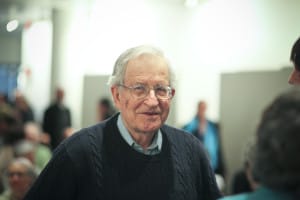Yanis Varoufakis and Noam Chomsky discuss Neoliberalism
This is the first video part of an event which was presented by LIVE from the NYPL at the NYPL in which the renowned linguist and political philosopher, Noam Chomsky, and the former finance minister and founder of the Democracy in Europe Movement, Yanis Varoufakis, talk about neoliberalism and its attacks on democracy. They also discuss the historical role that the private and public sector have played in the economy.
The following questions are also addressed in this video:
To read the full transcript text of this video, click here.
Notable excerpts from the video:
Yanis Varoufakis on the discrepancy between the philosophie and ideology of neoliberalism:
What strikes me given the last quite eventful year of my life, what really strikes me is the major disconnect between the philosophy and ideology of neoliberalism and that which I encountered when negotiating, inverted commas negotiating, when being dictated by the greater the good of the neoliberal international financial establishment. Think about it. If you take the great libertarians, the great neoliberals, who castigate all tax-funded activities, and you consider the reason why I’m here today and I’m not still the minister of finance of Greece. Why? It’s because I refused another hundred billion smackers, dollars, of tax-backed loan to my insolvent government, which the creditors insisted that I should take.
Yanis Varoufakis on the contradictions of neoliberalism:
I mean the whole notion that there can be a market system which is at an arm’s length separated from a state, which is the enemy, is the sickest joke in the history of humankind. If you think that this narrative of private wealth creation which is appropriated by the big bad wolf, the state, on behalf of trade unions and the working class that need a social welfare net, is just a preposterous reversal of the truth that wealth is being created collectively and appropriated privately but right from the beginning. I mean, the enclosures in Britain would never have happened without the king’s army and without state brutality for pushing peasants off their ancestors’ land and creating the commodification of labor, the commodification of land which then gave rise to capitalism. Just half an hour ago, we were being shown, some of us, the magnificent collection of maps of the city of New York in this wonderful building and you could see in one of the maps of Alabama, the precise depiction of the theft of land from Native Americans, the way in which it was parceled up, commodified. Now that would never have happened without the brutal intervention of the state and created the process of privatization of land and therefore of commodification.
Noam Chomsky on monopolization in neoliberalism:
As far as monopolization is concerned, the United States made a major effort to monopolize the basic resource for the early industrial revolution, namely cotton. That’s the oil of the nineteenth century, and the U.S. had most of it, not all of it, and the conquest of Mexico, which was not exactly by free enterprise, was largely undertaken to try to contain, to gain a monopoly of cotton which would overcome the major enemy in those days, which was Britain. Britain was the big force, the enemy, and the Jacksonian presidents, Tyler, Pierce, the mid-nineteenth century, their position was that if we could monopolize cotton, we could bring England to her feet, that way we could really defeat them. Didn’t quite make it, but made a lot. Incidentally, that effort was what Saddam Hussein was charged with in 1990, the charge was ludicrous, but the charge was he was going to try to monopolize oil and bring us all to his feet, which was crazy, but the U.S. try to monopolize cotton and that’s part of the way in which power shifted from England to the United States, and I think that’s a pretty good record of the way sound economics has worked over the years.
Noam Chomsky on the basis of contemporary economy:
You recall the IMF study of the leading American banks, which determined that virtually all their profits come from their implicit government insurance policy, cheap credit, access to higher credit ratings, incentives to take risky transactions which are profitable but then if it’s problematic, you guys pay for it, or just take the basis of the contemporary economy, which actually I’ve been privileged to see developing in government-subsidized laboratories for decades. MIT, where I’ve been since the 1950s, is one of the institutions where the government, the funnel in the early days was the Pentagon, was pouring in money to create the basis for the high-tech economy of the future and the profitmaking of the institutions that are regarded as private enterprises. It was decades of work under public funding with a very anticapitalist ideology. So according to capitalist principles, if someone invests in a risky enterprise over a long period and thirty years later it makes some profit, they’re supposed to get part of the profit, but it doesn’t work like that here. It was the taxpayer who invested for decades. The profit goes to Apple and Microsoft, not to the taxpayer.
To watch acTVism Munich’s video playlist on Yanis Varoufakis & DiEM25, click here.
To watch acTVism Munich’s video playlist on Noam Chomsky, click here.
 Noam Chomsky is a world-renowned political dissident, anarchist, linguist, author and institute professor emeritus at Massachusetts Institute of Technology, where he’s taught for more than half a century. Chomsky has written more than 100 books, his latest being “Because We Say So“. Chomsky has been a highly influential academic figure throughout his career, and was cited within the Arts and Humanities Citation Index (A&HCI) more often than any other living scholar from 1980 to 1992. His work has influenced a wide range of domains, including artificial intelligence, cognitive science, computer science, logic, mathematics, music theory and analysis, psychology and immunology. Chomsky also developed the propaganda model of media criticism with Edward S. Herman which they presented in their book “Manufacturing Consent: The Political Economy of the Mass Media“. Chomsky remains a leading critic of U.S. foreign policy, neoliberal capitalism, and mainstream news media.
Noam Chomsky is a world-renowned political dissident, anarchist, linguist, author and institute professor emeritus at Massachusetts Institute of Technology, where he’s taught for more than half a century. Chomsky has written more than 100 books, his latest being “Because We Say So“. Chomsky has been a highly influential academic figure throughout his career, and was cited within the Arts and Humanities Citation Index (A&HCI) more often than any other living scholar from 1980 to 1992. His work has influenced a wide range of domains, including artificial intelligence, cognitive science, computer science, logic, mathematics, music theory and analysis, psychology and immunology. Chomsky also developed the propaganda model of media criticism with Edward S. Herman which they presented in their book “Manufacturing Consent: The Political Economy of the Mass Media“. Chomsky remains a leading critic of U.S. foreign policy, neoliberal capitalism, and mainstream news media.
 Yanis Varoufakis is professor of Economic Theory at the University of Athens, founder of the Democracy in Europe Movement 2025 (DiEM25) and former finance minister of Greece.
Yanis Varoufakis is professor of Economic Theory at the University of Athens, founder of the Democracy in Europe Movement 2025 (DiEM25) and former finance minister of Greece.
In January 2015, Varoufakis was appointed as the Minister of Finance, and led negotiation with Greece’s creditors during the Greek government-debt crisis. However, he failed to reach an agreement with creditors, leading to the 2015 Greek bailout referendum. The day following the referendum, on 6 July 2015, Varoufakis resigned as Minister of Finance and was replaced by Euclid Tsakalotos.
5 replies on “Varoufakis and Chomsky discuss Neoliberalism”
[…] media site acTVism Munich released an excerpt from their one-hour dialogue on Tuesday. The first in a series of videos of the […]
[…] media site acTVism Munich released an excerpt from their one-hour dialogue on Tuesday. The first in a series of videos of the […]
[…] Quelle: actvism.org […]
[…] media site acTVism Munich released an excerpt from their one-hour dialogue on Tuesday. The first in a series of videos of the […]
Moin,
sehr anregende Veranstaltung, aber warum wurde die Audiospur komplett auf Links gelegt?
Sehr frustrierend.